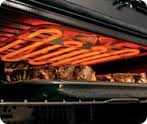
记忆方法
1. 就像热锅上的蚂蚁一样,导致焦躁、骚动、混乱、争吵、吵架。
中文词源
broil 烤
词源同brew, burn.
英语词源
- broil (v.1)
- "to cook," late 14c. (earlier "to burn," mid-14c.), from Old French bruller "to broil, roast" (Modern French brûler), earlier brusler "to burn" (11c.), which, with Italian bruciare, is of uncertain and much-disputed origin.
Perhaps from Vulgar Latin *brodum "broth," borrowed from Germanic and ultimately related to brew (v.). Gamillscheg proposes it to be from Latin ustulare "to scorch, singe" (from ustus, past participle of urere "to burn") and altered by influence of Germanic "burn" words beginning in br-. Related: Broiled; broiling. - broil (v.2)
- early 15c., "to quarrel, brawl," also "mix up, present in disorder," from Anglo-French broiller "mix up, confuse," Old French brooillier "to mix, mingle," figuratively "to have sexual intercourse" (13c., Modern French brouiller), perhaps from breu, bro "stock, broth, brew," from Frankish or another Germanic source (compare Old High German brod "broth") akin to broth (see brew (v.)); also compare imbroglio.
权威例句
- 1. I'll broil the lobster.
- 我会把这只龙虾烤着吃。
- 2. That would plunge them in the broil of the two countries.
- 那将会使他们陷入这两国的争斗之中.
- 3. This deadly broil fell out in the midst of Verona at noonday.
- 这件可怕的乱子是中午时候出在维洛那城的中心.
- 4. His success made his opponent broil with envy.
- 他的成功使他的对手妒火中烧.
- 5. He is in a broil of indignation.
- 此刻他正怒气冲冲.
